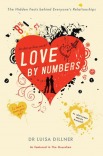
Of course such a broad description covers just about everyone, but Dillner's book has an originality. She is using scientific research that can answer questions such as:
- How do I know if he's the one?
- Are office romances doomed?
- What's the best way to mend a broken heart?
 RSS Feed
RSS Feed